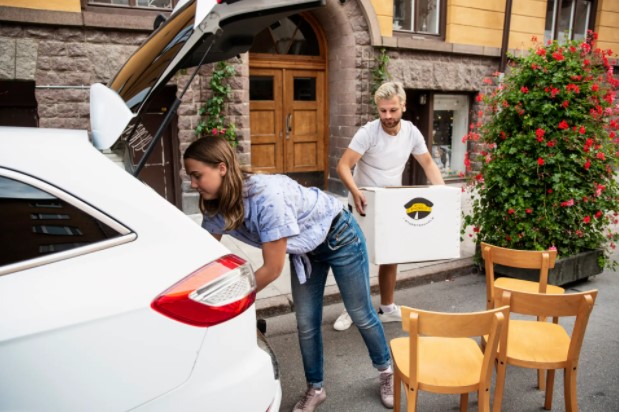MOVING TO SWEDEN IN 10 STEPS

By: Embassy of Sweden in Zagreb
Photo: Lieselotte van der Meijs
Here are 10 things to take care of when you move to Sweden – chronologically…
- Get a residence permit
This is almost always step one. Sweden’s Migration Agency (Migrationsverket) handles issues relating to immigration, visas, permits and citizenship.
Maybe you already secured the necessary residence permit required to legally reside and work in Sweden before arriving – through a job, family, or for study purposes. But you may still want to locate your nearest Migration Agency field or head office in case you need to renew permits.
- Register with the Tax Agency
The most important requirement as a new resident is to register with the Swedish Tax Agency (Skatteverket). This registration process (folkbokföring) ensures you’re added into the system for tax collection, personal identification, marital status monitoring, mailing address information and insurance purposes.
By registering with the Tax Agency, you will be assigned a unique personal identification number, ‘personnummer’ (similar to the British National Insurance number).
Your legal identity in Sweden hinges on this key number and it is used for everyday official tasks such as opening up bank accounts and getting paid by your employer.
- Find a home
Get started on finding a home as soon as possible, especially if you’ll be living in a big city like Stockholm, Gothenburg or Malmö.
You can rent ‘first-hand’ or ‘second-hand’ in Sweden. First-hand (första hand) means you sign an agreement with the owner of the building, while second-hand (andra hand) means you sign an agreement with someone who owns the flat or has the first-hand contract on the flat. In the big cities, obtaining a first-hand contract generally requires several years of queueing.
For second-hand contracts, there are many dedicated accomodation websites. Most ads are in Swedish, but you will find some in English too.
If you are moving to Sweden as a student, check first with the university you will be studying at. Some universities provide guaranteed housing for international students, but not all. Most universities have some kind of accommodation service available.
- Get an ID card
Once you’ve got your personal identity number, obtaining a Swedish identity card (identitetskort or ID-kort) from the Swedish Tax Agency is a logical next step.
A Swedish ID card is your primary form of identification around the country. It is used for opening bank accounts, using credit cards, picking up packages from the post office, and at doctor’s appointments – naming just four examples.
- Open a bank account
This one is quite simple: First, take care of steps two and four! Opening a Swedish bank account usually requires a Swedish ID card, or at least a Swedish personal identity number plus a valid passport.
The bank will help you obtain the necessary credit/debit cards and banking services you need. A bank account is very useful for bills and salaries, which are usuaually paid online. Make sure to download the Swish app as well!
- Find a job or start a business
If your residence permit also allows you to work in Sweden, you should consider registering with the Swedish Public Employment Agency (Arbetsförmedlingen) to get help with looking for the right job for you.
If you want to start your own company (eget företag), you will need to obtain an F-skatt (the ‘F’ stands för företagare – entrepreneur) status through the Tax Agency for tax purposes. You can also choose to register your company name through the Swedish Companies Registration Office (Bolagsverket).
Verksamt.se is a useful website if you want to start a business in Sweden.
- Arrange daycare or school
If you have children, investigate the different options available and get in touch with your local city council to begin the enrolment procedure.
- Learn Swedish
Don’t wait until the previous steps are completed. Begin today! A basic understanding of Swedish will make it easier for you to find your place in Swedish society. Once you have a Swedish personal identity number, you can sign up for free Swedish courses arranged by the government programme Swedish for immigrants (SFI).
- Pay taxes in Sweden
Sweden is well known for its developed social welfare system, and if you move here you will have to help finance it by paying taxes. The Swedish Tax Agency is responsible for collecting taxes, which vary upon income.
If you’re employed by a company, taxes are automatically deducted from your salary every month. The Swedish Tax Agency has an overview in English. For the self-employed, the tax structure is slightly more complicated. If you plan on starting as a sole trader, you will need to register for F-skatt (the ‘F’ stands för företagare – entrepreneur). The Tax Agency has more information on taxes for businesses.
Read more about Swedish social insurance at the Swedish Social Insurance Agency (Försäkringskassan).
- Get a Swedish driving licence
If you’re planning to drive in Sweden, check up on whether you can use your current licence (körkort) or if you’ll need a new one. Familiarise yourself with Swedish road rules, signs and parking regulations.
After one year as a resident, you are usually required to obtain a Swedish driving licence. For that, you contact the Swedish Transport Administration (Trafikverket).




